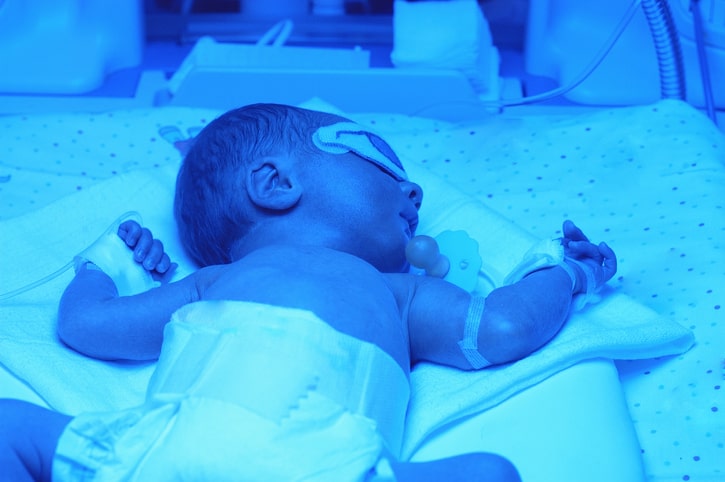Jaundice is one of the most common challenges seen in newborn babies. Nearly 6 out of 10 babies develop jaundice in the first four days of life, and that statistic jumps to 8 out of 10 in the premature newborn population. Nearly everyone has heard of it, but few know exactly what it is. Alzein Pediatrics is here to explain that jaundice is not as complicated or scary as it may sound.
What is Jaundice?
Jaundice is a medical condition that is a result of the liver not being able to produce bilirubin quickly enough, turning the baby’s skin and whites of the eyes yellow. Bilirubin is a natural product produced in the liver as it breaks down red blood cells. The bilirubin is then discarded through the bowels.
When the liver cannot process the waste from the red blood cells fast enough, the bilirubin is released into the body, resulting in the yellowing of the skin. This is why jaundice is more common in babies born before 37 weeks of gestation, because the liver may not be fully developed.
Most cases of jaundice are diagnosed while the Baby is still in the hospital and treatment is completed before discharge. This treatment usually involves phototherapy, positioning the Baby, and wearing just a diaper under blue bili lights. The wavelengths in this light help break bilirubin down to be evacuated through the Baby’s bladder and bowels.
Jaundice Treatment and Prognosis
If you suspect your baby has jaundice but are unsure, an easy test is to press lightly on their nose. Bilirubin levels are normal if the skin appears slightly lighter in color for a moment. If the pressure point on their nose turns yellow, it’s likely your baby has a buildup of bilirubin.
After consultation with your Alzein Pediatrics health care provider, a minor case of jaundice may be remedied by ensuring that your baby is amply fed. Proper hydration, about 8-12 feedings per 24 hours, will flush your baby’s system, removing the excess bilirubin. Jaundice should clear up and the yellow cast disappears within 1-2 weeks.
Note: It used to be recommended to put the baby in sunlight to clear up mild jaundice. This is no longer recommended. Indirect sunlight is not consistent and direct sunlight can cause sunburn and a dangerous increase in body temperature.
If you notice that your baby’s arms, legs, or stomach is turning yellow, jaundice may be more severe. This could be caused by an enzyme deficiency, liver malfunction, biliary atresia when bile ducts are blocked or scarred, or an incompatibility between the mother’s blood and the baby’s blood while the baby was in utero.
Although very rare, when jaundice is not diagnosed properly and treated promptly, it can cause:
Acute bilirubin encephalopathy: A condition when bilirubin reaches brain cells causing high-pitched crying, backward arching of the neck, poor feeding, and a fever.
Kernicterus: Occurs when acute bilirubin causes permanent brain damage resulting in uncontrolled movements, hearing loss, permanent upward gaze, and improper development of tooth enamel.
If you suspect your baby has jaundice after bringing them home from the hospital, call Alzein Pediatrics immediately at 708-424-7600 or visit our Urgent Care asap. It is important to get your baby seen to determine the exact cause of jaundice and begin treatment as soon as possible.


